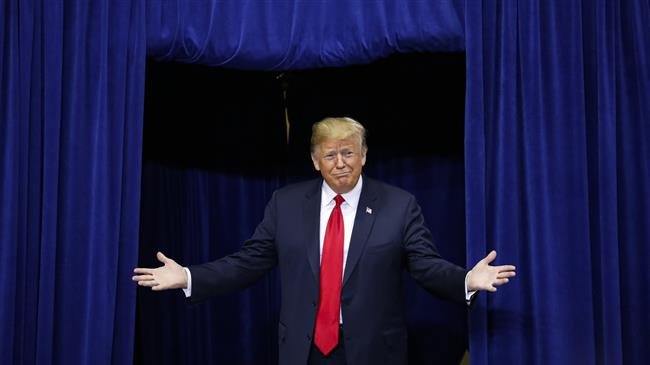27, September 2019
US: Trump abused office, forced White House to cover it up 0
The whistleblower complaint at the heart of the burgeoning controversy over President Donald Trump’s call with the Ukrainian president claims not only that Trump misused his office for personal gain and endangered national security, but that unidentified White House officials tried to keep it a secret even within the government.
In seven stark, carefully worded pages, the unidentified whistleblower alleged the commander in chief pushed his foreign counterpart to investigate Democratic presidential contender Joe Biden and his son Hunter Biden, and that senior White House officials then tried to “lock down” records related to the matter.
The pressure, the whistleblower alleged, came in a phone call July 25 between Trump and President Volodymyr Zelensky of Ukraine, an exchange that turned so politically problematic that White House lawyers directed other officials to remove the electronic transcript of the conversation from the computer system where it was stored.
The transcript, the whistleblower alleged, was then loaded onto a separate system meant for highly classified information. And according to White House officials who informed the whistleblower, that was “not the first time” a transcript was put there due to concerns about politics rather than national security, the complaint alleged.
Trump, the whistleblower wrote, was “using the power of his office to solicit interference from a foreign country in the 2020 U.S. election.”
The whistleblower’s assertions — made public Thursday after House Intelligence Committee Chairman Rep. Adam B. Schiff (D-Calif.) released the person’s complaint — fueled an already intense political battle that this week led congressional Democrats to formally launch an inquiry into whether Trump should be impeached.
At a hearing to question Trump’s acting director of national intelligence, Joseph Maguire, Democrats pressed him on why he had not given them the complaint sooner, as they say the law required. Republicans attacked the reliability of the whistleblower’s information as unproven hearsay.
Maguire told lawmakers he believed the whistleblower had acted “in good faith,” but declined to offer any conclusion about the allegations.
House Speaker Nancy Pelosi (D-Calif.) read portions of the complaint to reporters Thursday, declaring: “This is a coverup.”
Trump lashed out publicly and privately against the accusations. At a closed-door event in New York to thank U.S. personnel who had worked on Trump’s visit to the United Nations General Assembly, the president suggested darkly that the people who spoke about his conversation with Zelensky should be viewed as traitors.
“I want to know who’s the person, who’s the person who gave the whistleblower the information? Because that’s close to a spy,” he said in a recording of the remarks obtained by the Los Angeles Times. “You know what we used to do in the old days when we were smart? Right? The spies and treason, we used to handle it a little differently than we do now.”
(Source: The Washington Post)




























27, September 2019
Ambazonia leaders Shun Biya’s ‘National Dialogue’ 0
Next week, Cameroon’s government will host what it calls a national dialogue on the separatist crisis in its Northwest and Southwest regions. However, U.S.- and Europe-based separatist leaders invited to the talks say they will not take part in any dialogue unless it is held outside Cameroon with non-Cameroonians as mediators. The government has stated it will not accept a foreign mediator.
The week-long dialogue on the separatist crisis is due to begin Monday in Yaounde. The government says it has invited more than 1,000 people, including lawmakers, clergy, teachers, and civil society activists.
However, none of the U.S.- and Europe-based separatist leaders contacted by VOA said they will attend the talks.
Among those turning down the invitation is Eric Tataw, who lives in the United States.
He says he will not attend because he and fellow separatists based in the diaspora are wanted in Cameroon on charges of secession and terrorism.
Those are the same charges for which separatist leaders Ayuk Tabe Julius and 10 collaborators were arrested and sentenced to life in prison by a Yaounde military tribunal.
Tataw says Cameroon should free Julius and the other leaders as a sign they are truly ready for dialogue.
“I have told them categorically clear that let them release all detainees, and then start discussing with them and then from there we will know if the president of Cameroon is serious to have dialogue or not,” said Tataw.
Fighting in Northwest and Southwest Cameroon has claimed more than 2,000 lives since hostilities broke out two years ago. English-speaking armed groups in those regions want to break away from the rest of Cameroon and its French-speaking majority.
Some separatists have said on social media they want the dialogue to take place either in Switzerland or Ivory Coast, under the supervision of world powers like the U.S., Germany and Britain, and in the presence of the United Nations.
George Ewane, spokesperson of the national dialogue, says Cameroon’s President Paul Biya has ruled out the possibility of inviting a foreign mediator. Some nations that have offered to mediate, he says, have not stopped Cameroonians in the diaspora from financially sponsoring violence back home.
“Some make the propositions in good faith but we also know that others do not do that exactly in good faith,” he said. “Now let me ask a question. Are Cameroonians, are Cameroonians unable to solve their own problems to the extent of seeking a foreign mediation? The answer is an emphatic no. International mediation is not necessary.”
Ewane did not name the countries he was referring to, but last July, the Swiss ambassador to Cameroon, Pietro Lazzeri, announced his country was helping the Cameroon’s government negotiate with the rebels.
Source: VOA